#love how they keep subverting gender roles in so many ways
Text
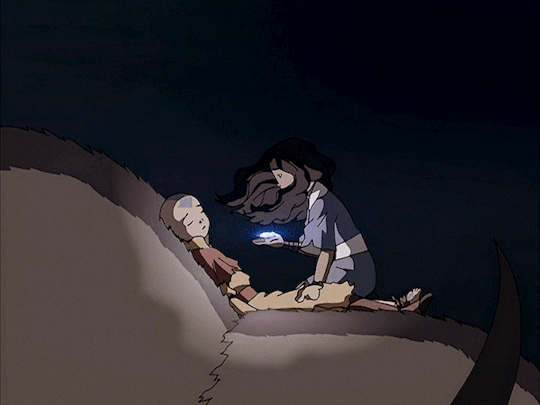
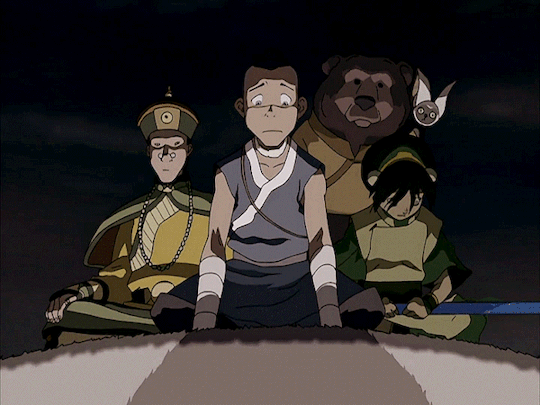

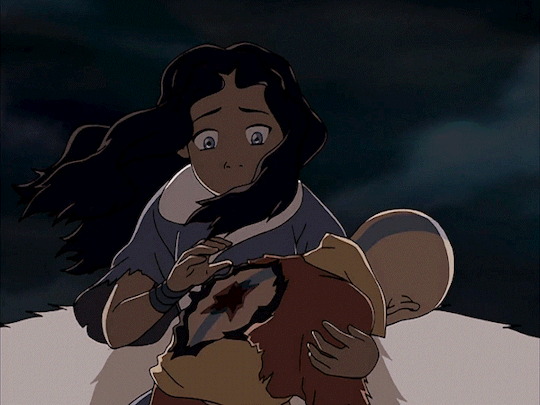
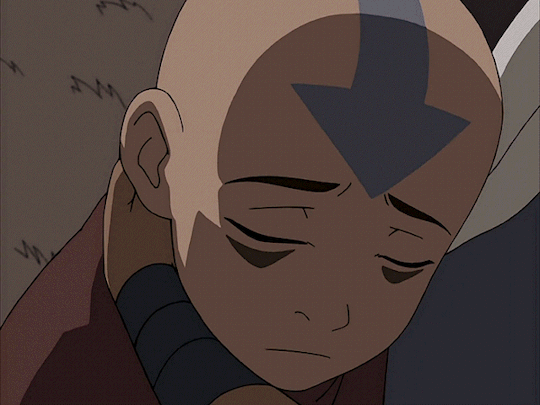
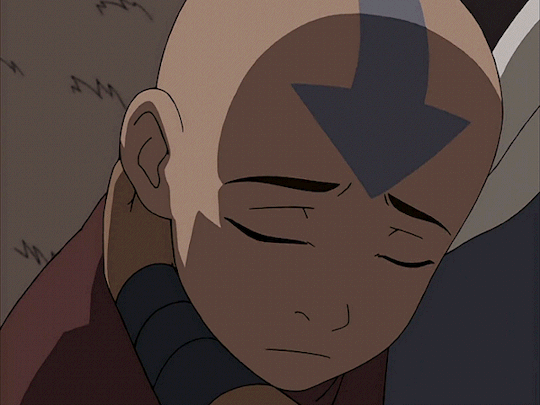
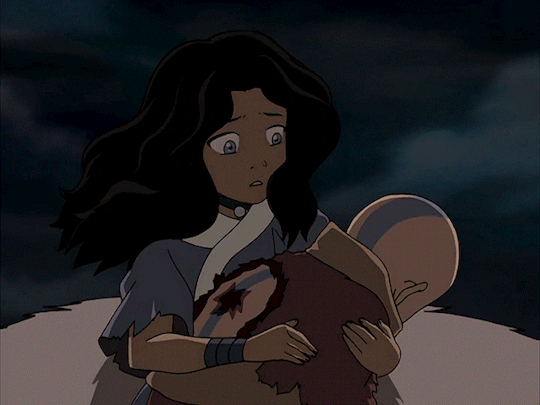
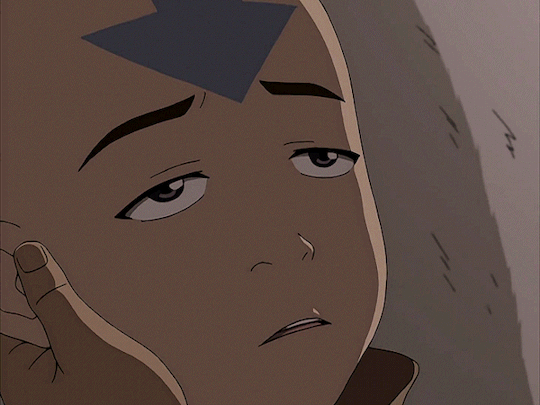
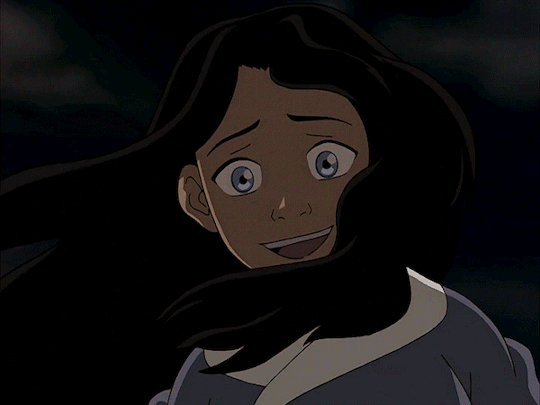
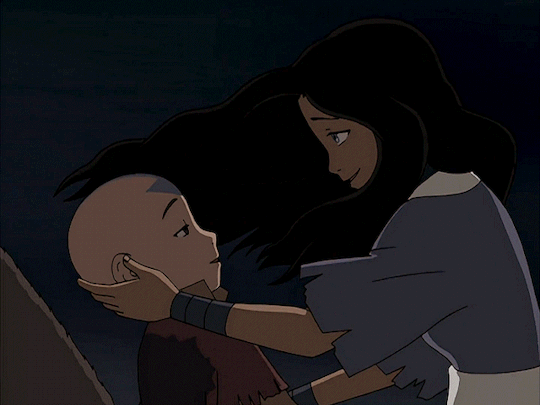
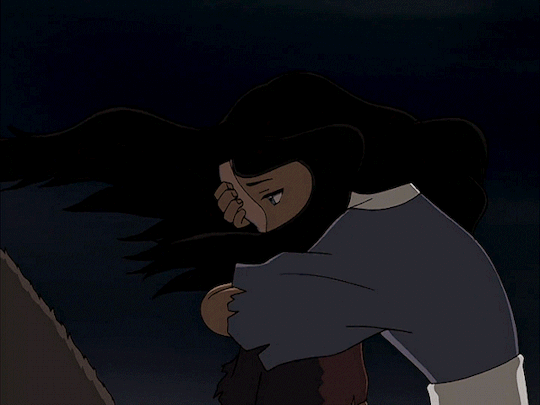
Mal's Avatar: The Last Airbender rewatch: The Crossroads of Destiny 2.20
#atlarewatch#avatar the last airbender#atla#aang#katara#kataang#gifs#avatarthelastairbenderedit#atlaedit#aangedit#kataraedit#kataangedit#useramys12#tusersimone#userthing#userotp#smallscreensource#has one part of YOUR otp brought the other back to life? didn't think so#love how they keep subverting gender roles in so many ways#the way katara holds aang in the bridal position before this#also love how this parallels their first meeting#on another note i hate how i haven't giffed azula yet#i love her so much but all of her best moments so far has been in episodes with way more important moments for me to gif#she's in season three even more though so i surely will have before this series is over
282 notes
·
View notes
Text
last year i talked somewhat about jonathan harker in the role of the gothic heroine, which seemed to go over well! this year i've decided to challenge myself to delve a little deeper and keep my literary analysis skills sharp (trying to keep away from anything revealed later than today's entry, for the new readers)
for context in the literary background i'm examining here, the female gothic (a term coined I believe in the 70s) is a lens of analysis for gothic literature which examines the role of women as expression of contemporary anxieties around women and their roles in society, particularly as mothers and wives. like many kinds of horror, political and social anxieties are deployed as supernatural forces with which to terrify the "ordinary" citizens.
jonathan, our ordinary man, is certainly faced with horrors—but in what way? sent by an older man, Peter Hawkins, jonathan enters a foreign landscape where he enters into the power of another older man, at a particularly vulnerable time where a loved one (Mina) is waiting at home but jonathan does not appear to be married. the horrors that jonathan faces are the same trials set up against gothic heroines: threatening older men with power over you, poised at a huge point of transition in your life, etc, etc.
the main argument against jonathan as a heroine is, I think, his job. His transition point right now isn't an impending marriage or that he needs one, but that he's just established himself as a solicitor and is meeting with Dracula for business purposes. however, I think how these are deployed as tools in the story, such as Hawkins almost transferring guardianship of his young employee/ward to Dracula (temporarily), still very much mirror the ways in which high-class social norms are deployed against gothic women. even the work jonathan does in the castle (talking to dracula about real estate) isn't in service of bolstering his manly prowess, but serves as a tool for dracula to distract him, and keep him from realizing that he is trapped and serving dracula's own will.
rather than being tried in a manly fashion by his strength or his wits being challenged, jonathan's gothic experience is of his environment and even his body being manipulated by the man meant to be a helping hand in a foreign land. when I say body people might think it's a little early for that, but it's happening—dracula keeps jonathan up late so he sleeps in, forcing him to acclimate to dracula's own nocturnal existence. when he gets a glimpse of blood, he attempts to take it from jonathan. even today, a few hundred years after dracula's social anxieties about women's bodies being trespassed upon by men other than the ones entitled to them, women may see echoes of their own anxieties about bodily autonomy.
Dracula also isolates jonathan socially. He makes jonathan mistrust his own ability to percieve reality (gaslighting, anyone, a story about a woman being manipulated by her husband?) by pretending that servants are in charge of the cooking and so on, when really it's just dracula keeping up a masquerade.
this comes to a head in the mirror scene, where jonathan's shaving mirror—an item he uses to attend to his appearance—ends up being a helpful tool which exposes the supernatural reality of what jonathan's up against. however, because dracula is still the one in power, he immediately gets rid of it, calling it "vanity". I recall the quote by John Berger:
You painted a naked woman because you enjoyed looking at her, put a mirror in her hand and you called the painting Vanity, thus morally condemning the woman whose nakedness you had depicted for you own pleasure.
the ways in which jonathan is treated by dracula, and the ways in which he attempts to bolster himself against the threat (spying to see what dracula's really doing, seeing the lack of reflection by chance) mirror the highly gendered dynamics of the Victorian era which this book was written in the tail end of. perhaps purposefully subverting jonathan's gender as a further expression of the horror of dracula, stoker's work takes jonathan as a man secure in his position at home in england to being a manipulated, isolated, and precariously positioned figure subject to the whims of an abusive man while friendless in a foreign country
(and the essay on how race, ethnicity, and foreign versus home plays into this is a whole other post! racism effects gender too! it's not a mistake that jonathan is securely male at home but his gender is subverted abroad!)
#dracula daily#dracula#female gothic#jonathan harker#ok i have to stop myself here and do my actual homework
410 notes
·
View notes
Text
Director Deep Dive: The “Feminine Gaze” of Zeng Qingjie (A Familiar Stranger, Butterflied Lover)
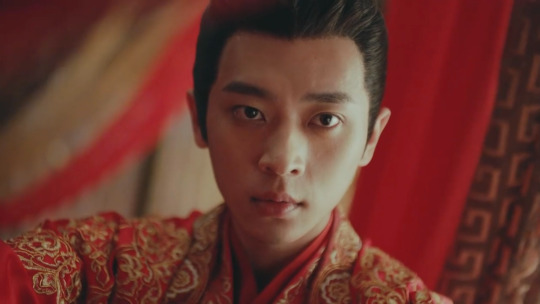
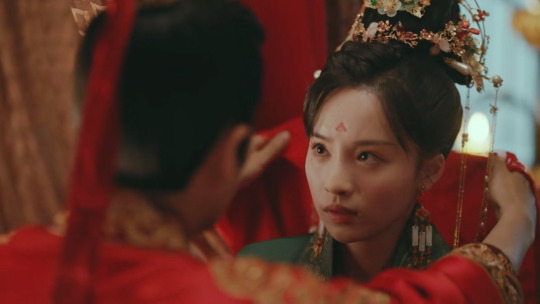
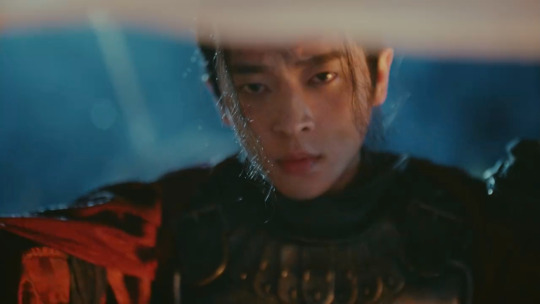
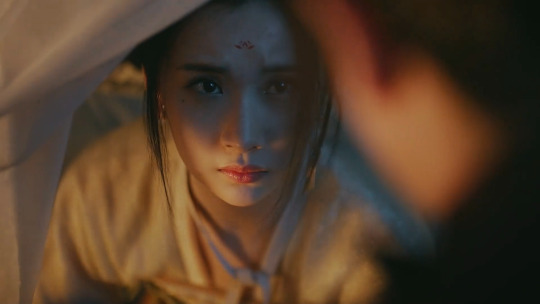
What does it mean to film something through a “feminine gaze”?
Unsurprisingly, this is a tough question to answer. In filmmaking, the feminine gaze is usually offered as an alternative to the “male gaze” or the ways movies and tv depict women as passive sex objects. Although filmmakers and scholars disagree over the definition and even value of the term, I like to think that, in its most basic form, the feminine gaze is visual storytelling that subverts or redefines how gender looks on screen.
I think one director whose visual storytelling often taps into that feminine gaze is Zeng Qingjie so I thought it would be interesting to discuss some of the stylistic choices that make his work unique.
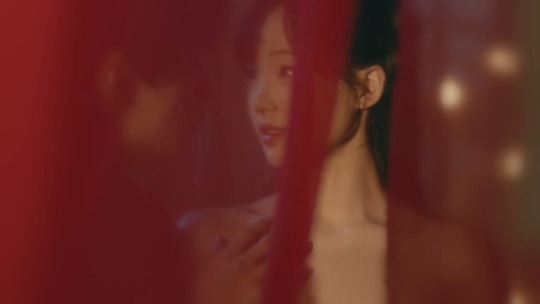
I first came across Zeng’s work via the short dramas A Familiar Stranger and Butterflied Lover.
What struck me about these two fantasy romances is how different they feel despite having relatively standard plots for their genre. Both dramas are dreamy and refreshingly sensual and intimate. They touch on taboo topics like menstruation, abortion, and the dangers of pregnancy while also quietly challenging traditional gender roles. But most interesting to me is how they center their women protagonists not just in the plot but in the way the camera captures their image. These are women stories and it's evident down to the cinematography.
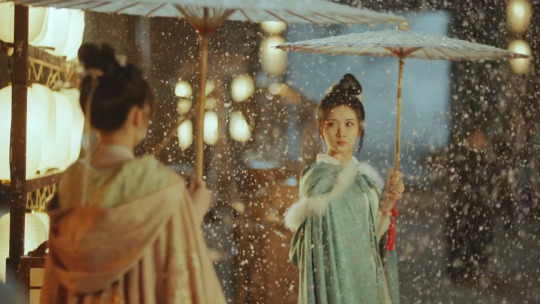
Style Element: Subjectivity
For instance, Zeng's visual storytelling often uses subjectivity.
Subjective cinematography is when we the viewers see what a character sees or feel what a character feels because of the camera’s position, movement, lenses, etc. It’s considered a critical feature of the feminine gaze because it forces us to recognize the thoughts and feelings of women characters who are often overlooked in traditional media.
Zeng adopts several cinematography techniques to put the audience in the mind of his women protagonists, and together these techniques encourage us to empathize with them, especially in their darkest moments.
One of my favorite examples of this is an early scene of Butterflied Lover.
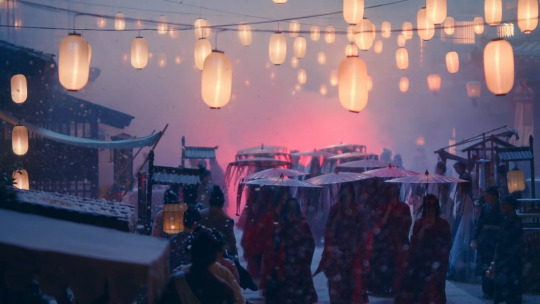
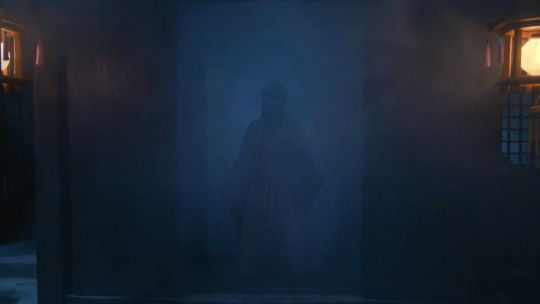
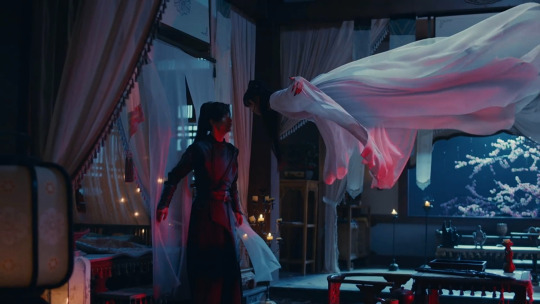
In the drama, Tang Qianyue, the FL, has been infected by a poison that turns people into monsters known as "butterfly slaves". Qianyue knows she has been infected but to appear normal in front of her loved ones secretly suppresses her monster form. One day, however, she begins turning into a butterfly slave against her will.
As seen above, the scene of her transformation consists of many long shots that showcase the full horror of her monster form.
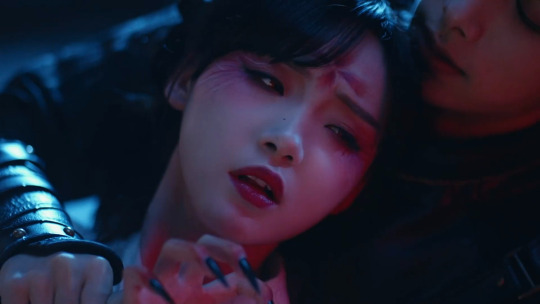
But the scene ends with a close-up of her face, the camera lingering on the anguish she feels at her body betraying her. Look at how the camera keeps her face in focus but her claws blur with the background, her blood-red eyes hidden in shadow. Zeng wants us to understand how she feels in this moment, not what danger she presents. She might be a monster but we feel pity for her rather than hate or disgust because of the humanizing subjectivity of the camera language.
(Side Note: I don't think it's an accident that most of the infected people shown in their butterfly slave form are women given that monsters in media often symbolize the unknown or uncontrollable elements of the feminine experience. It makes me wonder about the role of female monsters in Chinese myth and whether there are parallels to their patriarchal meaning in Ancient Greek mythology.)
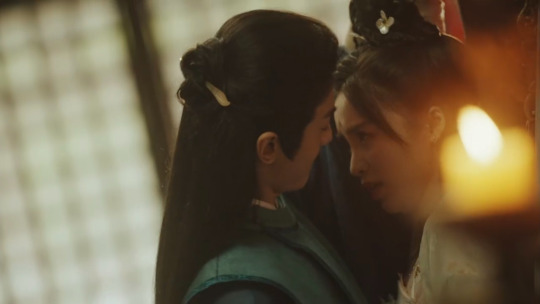
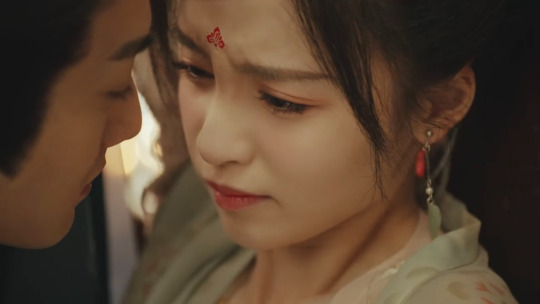
I think another good example of this humanizing camera language is in the sexual assault scene of A Familiar Stranger.
Unlike many shows that depict sexual assault in an erotic way (i.e., filmed to make us sexually excited about a woman’s powerlessness and nakedness), Zeng uses a combination of close-ups, shallow depth of field, and canted angles to make us feel the violation. With the intimate but disorienting effect of these camera techniques, we feel Shi Qi's duress but also clearly see her attacker's abuse of power. We feel what she feels and therefore have a better understanding of what it's like being a woman trying to navigate the world. It’s an awful moment but one that doesn't objectify or visually disempower her as a character.
Style Element: Sexuality and Feminine Desire
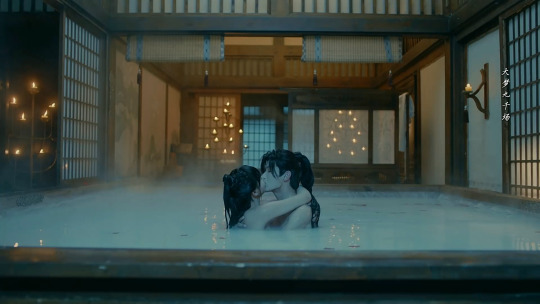
(Side Note: Woot woot pregnancy sex)
Zeng also challenges the ways women's bodies are typically objectified on screen by how he portrays his characters' sexuality. In his dramas, women aren't sex objects but instead subjects who experience sexual desire and express their sensuality.
I love the intro of A Familiar Stranger for this very reason.
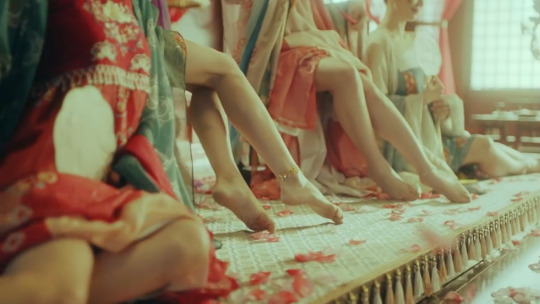
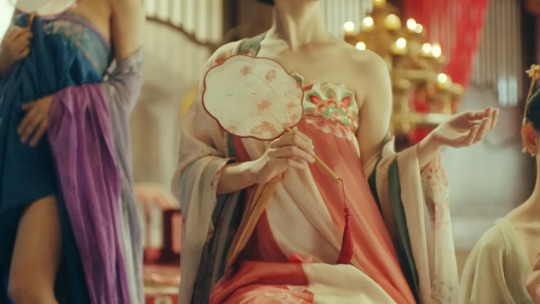
The show opens with the camera languidly panning across a line of bare legs and scantily clad bodies, their owners posed seductively. It’s a stereotypical example of the male gaze reducing women to their bodies.
But then Zeng's subverts this male gaze when has has one of the women look right into the camera in a subtle fourth wall break.
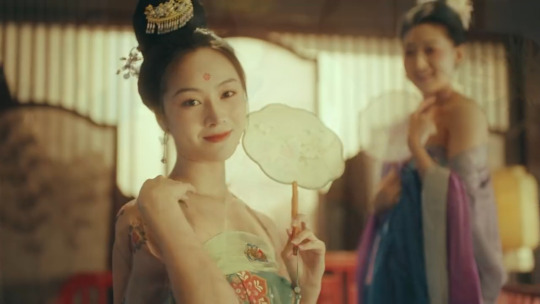
According to filmmaker-critic Joey Soloway, such moments are an example of "returning the gaze" and are a way for women characters to articulate how they feel about being seen as objects:
"When a female character breaks the fourth wall, they acknowledge the reality that they are being watched and are refusing to remain passive in that. Instead of being gazed upon, they remind us of their agency by directly addressing us and giving us insight into what they’re thinking and what emotions their actions are being motivated by." (Mariel Cipriaso)
Through this technique, we learn that the seductive performance is not for the benefit of some man on screen (or in the audience) but instead themselves. These women, who also happen to be sex workers, are posing for a portrait as a cheeky way to celebrate their own beauty and sensuality divorced from the services they provide male clients (with some sapphic undertones to boot!).
They are in control of the camera not the other way around.
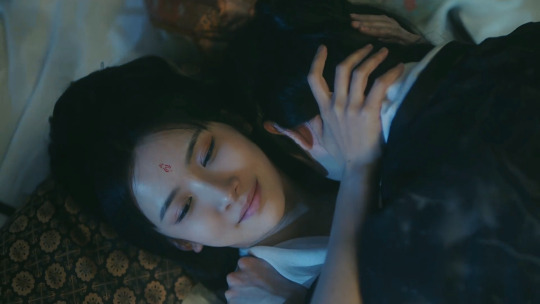
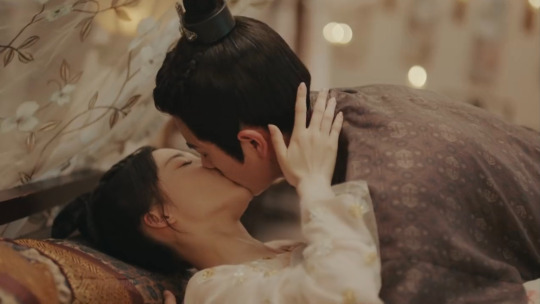
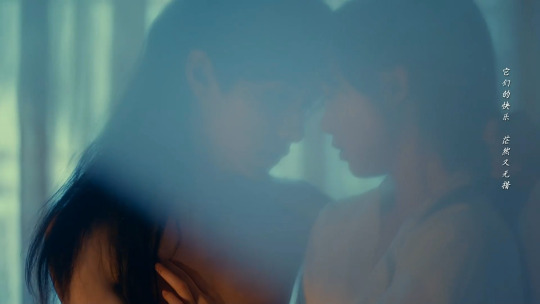
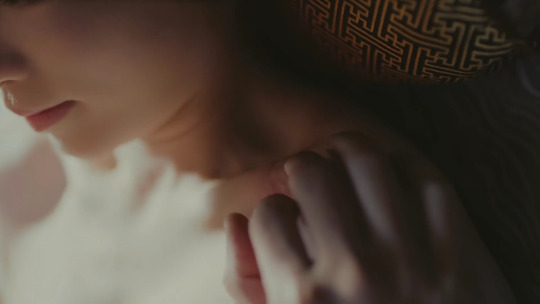
Ultimately, these are stories where women find pleasure, and the intimacy scenes reflect that.
Everything is softly lit and impressionistically shot as if the characters are lost in the haze of their mutual desire. The use of close-up and extreme close-up shots further play with our senses, giving us the tactile feeling of skin on skin, breath against breath. Unlike stories filmed through the male gaze, Zeng’s camera doesn’t reduce his women characters to body parts and mere receptacles of male desire—they’re active participants who desire and enjoy their partners just as much.
And what I find particularly interesting is that the scenes don’t just “center” these women’s POV but instead show how sex (and touch more broadly) is a vehicle for emotional intimacy and the impact of that intimacy on their male partners. (That hand flex below is giving Mr. Darcy.) Sex and physical intimacy between men and women is transformative not exploitative.
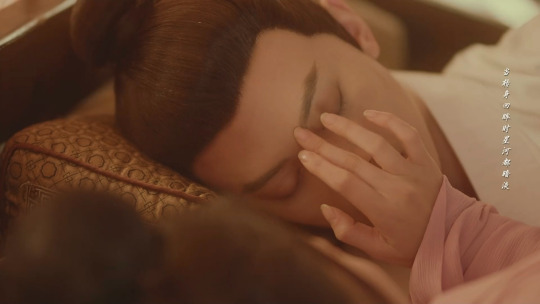
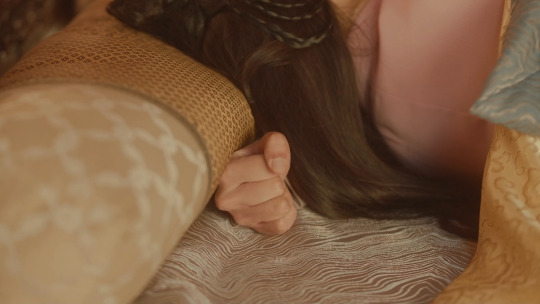
In these two dramas, women aren't objects of desire that men use for their own pleasure but instead subjects who are seen as such by the other characters* and, most importantly, Zeng Qingjie's camera.
(*Side Note: See @well-dressedwords' excellent analysis about the ML in A Familiar Stranger. His intuitive trust towards the FL is an example of seeing her as a subject. He doesn't recognize her for superficial reasons like beauty but her character, which he was able to glean when they first meet and she saves him--hence the title A Familiar Stranger.)
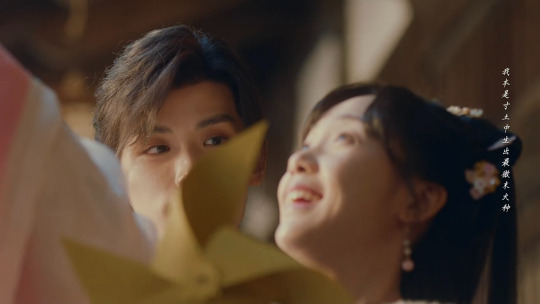
#Zeng Qingjie#a familiar stranger#虚颜#butterflied lover#风月变#cdrama#meta#cinematography#Ke Ying#cheng lei#Rain Lu#zhao yi qin
20 notes
·
View notes
Note
I really like how this person put it that a reason beacon Yang leaned more towards feminity and probably experienced comphet is that she thought in order to fill the role of mom for ruby, she had to become Summer in almost every way possible, even at the cost of her own individuality. And we know Summer chose to present feminine and while I like the bi Summer hc, the only relationship Yang saw growing up was between tai and Summer. So I can imagine losing Summer at such a young age, Yang's only conception for "how to be woman" came from what she remembered about Summer. (+ growing up in a small island and only having time to raise ruby meant she probably didn't get out much to socialize despite the facade she puts on as a party girl) I don't know if this makes sense or not 😭 but I like the idea that Yang tried so hard to be a copy of Summer for ruby's sake that it stunted her own growth for self realization and that's why we now see her embracing her masculinity + figuring out she's a lesbian (+ the whole being new to relationships thing) Honestly love how yangs character subverts the "tomboy only becomes happy when she becomes girly and boycrazy" trope that I hated from the 90s and 2000s by making it the reverse, -> feminine girl is truly happy when she becomes masc/a lesbian. Yang is truly such a complex character with many facets from her gender and sexuality to her disability to her parentification coupled with abandoned issues etc
https://x.com/CookBlakeAgenda/status/1733301553371472056?t=Kg63lzZXP8IrlIcvWpFfWQ&s=19
This makes complete sense. Yang's early life revolved around Summer and Ruby and then just Ruby. It follows that she would try to emulate the one real mother figure she had and yeah, living on Patch probably didn't help things
Like so many of us, she gets out into the wider world and meets new people, has new experiences and starts to fit the puzzle pieces together.
I know it's no surprise that I completely adore Yang, she's so fascinating and complicated and "more than meets the eye" and is always open to discovering more about herself and changing and growing.
"If there's something I'm missing, it's not because I lost it, it's because I haven't found it yet and the only way to do it is to keep going."
19 notes
·
View notes
Text
15 Days of Freyja Devotion
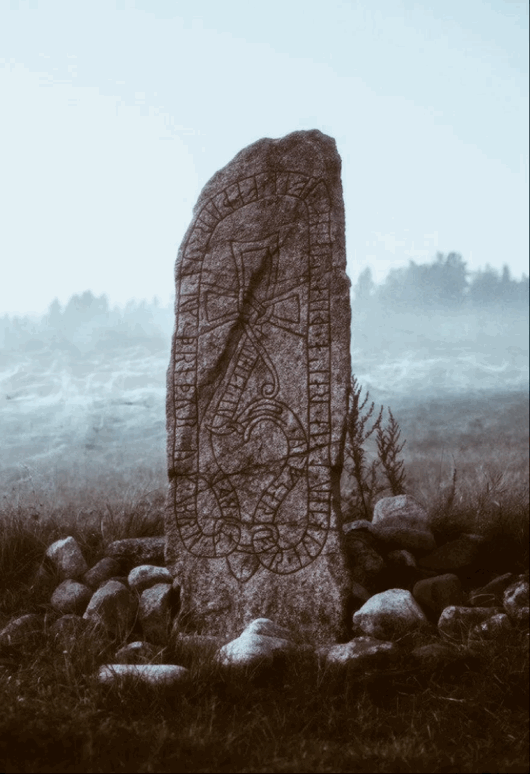
Day 6: Relations to Other Gods
This is where it gets... controversial.
So. Keeping in mind that true, pre-Christian Heathenry is not well documented, and keeping in mind that "Heathenry" is an umbrella term for a collection of regional traditions that could and did contradict each other, it's hard to make generalizations about the gods and their relationships to each other. Two seemingly contradictory interpretations can both be supported by textual and archaeological sources, and may in fact have coexisted historically. This becomes especially clear when talking about Freyja's relationships to the other gods. What is presented in this post is my own interpretation based on research and personal experience. Other Heathens may disagree, and that's okay.
As I mentioned on Day 2, Freyja is the daughter of Njord and an unnamed mother and is the sister of Freyr. This, at least, is pretty consistent across all Norse Heathen traditions.
Freyja's husband is called Odr. Some scholars, such as Jackson Crawford, believe that Odr is Odin, and I tend to agree. Odr and Odin seem to be different forms of the same name, and Odr is described as a mad wanderer, which sounds a lot like Odin. There are also places in the Poetic Edda where Freyja seems to be referred to as Odin's wife or lover.
On a more personal note, I experience Freyja and Odin as deities that are very closely connected. There is a lot of overlap in their powers and associations, and they seem to frequently work together. Based on this and the textual evidence, I tend to see Odin and Freyja as partners and spouses.
Freyja is also sometimes said to be the consort of her brother, Freyr. Remember, the Eddas say sibling marriages are a common practice among the Vanir, so this wouldn't have been seen as a taboo, incestuous pairing. I think it's also important to note that while the gods are like humans in some ways, they are also abstract ideas and, in some cases, forces of nature. As siblings and lovers, I see Freyr and Freyja as embodying the male/masculine and female/feminine aspects of fertility. (This makes it even more interesting that they both subvert Norse gender roles in some ways -- for example, Freyr gives up his ability to fight while Freyja revels in warfare.)
I am comfortable saying that both Freyr and Odin are Freyja's partners and lovers. The Old Norse practiced what we would recognize as polyamory or open relationships, so it makes sense that Freyja, like many of the Aesir, would have multiple lovers.
In Old Norse society, marriages were literal legal contracts and were often used to seal alliances and treaties. (In Anglo-Saxon England, which is not Norse but is a related culture, brides were called "Peace Weavers" because of how common these political marriages were.) It makes sense that Freyja, who is important or possibly royal among the Vanir, would be married to Odin, the chief of the Aesir. We know Freyja and her family went to live with the Aesir as peace hostages after a war between the Aesir and the Vanir. A marriage contract between Odin and Freyja would have helped keep war from breaking out again.
I see Freyja's partners as reflecting different sides of her as a goddess. Freyr reflects and complements her associations with sex, fertility, love, beauty, and agriculture. Odin reflects and complements her associations with magic, battle, death, and prophecy. Interestingly, both Odin and Freyr are associated with kingship and were said to have fathered lines of mortal kings, which may hint at some sovereignty aspects for Freyja.
And because I know someone is going to bring it up if I don't: yes, Frigg is also called Odin's wife and is arguably given this title more often than Freyja in the Eddas. Again, because having more than one lover was socially acceptable to the Old Norse, I don't necessarily see this as a contradiction. Maybe Frigg is Odin's wife and Freyja is his concubine. Maybe he was married to both of them at different times, but divorced one and then married the other. Maybe they're a functioning polycule. I don't necessarily need to know the answers to love and respect the gods.
There is a popular academic theory that Frigg and Freyja were originally one goddess, and I do see some truth in it. Talking about this theory would easily double the length of this post, so I'll just link to Jackson Crawford's excellent video on this instead.
I mostly agree with Crawford's conclusion that Frigg and Freyja were originally a single sex-and-queenship-and-motherhood-and-magic goddess who was Odin's wife, and that they had recently split and were in the process of becoming differentiated when the Conversion began. In terms of modern worship, I see them as separate but closely connected goddesses with some shared functions, similar to how I see the three Morrigan sisters in Irish polytheism.
#15 days of freyja devotion#15 days of deity devotion#freyja goddess#freyja#freyja deity#norse heathen#norse heathenry#inclusive heathenry#heathenry#heathen#pagan#paganism#deity work#mine#polyamory
74 notes
·
View notes
Note
Hi Drones! Love your Mareach fanfics (literally top notch💯). I was wondering, what are your thoughts on the movie (assuming you’ve seen it😅)? I have a few thoughts on it, but would love to hear yours!
Hey there!! I appreciate the ask! (And OMG thank you for reading my fics, that's so sweet of you 😭)
I have finally seen the Mario movie and I do have a lot to say haha, and I'm cool with sharing my broad thoughts this way, but if you're looking for a more in-depth discussion then I'm happy to discuss more in a PM!!
Just a brief disclaimer; my opinion reflects only my personal preference! I don't have any problem with disagreement or anyone who feels differently.
I will say the movie was a lot of fun! It was so surreal to see the Mushroom Kingdom on the big screen, and to hear such familiar melodies in cinematic arrangements. It was downright magical, actually. There was plenty to laugh and be amazed at, and so many references that had me grinning the entire time!
About the plot though 😅 There are pacing and some narrative critiques that I've seen so I won't say anything beyond that. The most important thing for me is I believe in the merit of a children's movie being all fun and silly, but I also really feel like this film went out of its way to avoid social commentary at its own expense. Not for no good reason; I know Nintendo does everything possible to keep the Mario franchise as family friendly as possible. But in terms of an impactful story, it fell sort of flat in my view. I feel as if it could have benefitted from some kind of social commentary beyond it's shot at subverting the damsel-in-distress trope.
(That in particular felt like performative feminism in a sense. Maybe it wasn't, maybe it was a sincere attempt at empowering an iconic character. But the default answer in a lot of media to empowering women these days seems to be "make her strong the way that the men characters are." A girlboss, I guess. It feels performative for me because it reaffirms with the idea that strength in character can only be relevant/seen within masculine qualities, and writers can just say "but it's a woman!" while continuing to disregard more feminine examples of strength. It's like a Get Out of Jail Free Card to acknowledging gender inequality.
Like, the problem wasn't that she's a damsel-in-distress; the problem is how pervasive the trope of damsel-in-distress used to be across the board. Except now, pop culture has sort of swung the other way. The problem isn't the girlboss character, the problem is that the girlboss character is perceived as the only correct way of writing "strong women characters." It's just sort of missing the point. The problem is still the same; women characters are stuffed into the same small box of behavior, attitude, and ultimate role depending on what's trendy at the time. I love the damsel-in-distress trope. I also love the girlboss. But it can be tiring to see that same story over and over again, feeling as if there are only a few options for writers to portray women, and realizing that it represents a sort of confinement of understanding for what women are allowed to be in real life for social acceptance, too.)
I get the desire to avoid politics and social issues. I really do, but in my position (studying social sciences), I see social issues as unavoidable. To go without acknowledging them is to ignore them, and from a story perspective, to go without them also kind of makes it boring?
I've seen the argument that it's a children's movie, therefore it doesn't have to be complicated. That's absolutely valid. I wish I could go back to having no thoughts lol. But it's my personal preference to watch a film that makes me think and consider the world from another point of view. And in response to that argument, all I can really say is basically my favorite genre is children's films that have social commentary. (See The Iron Giant, Wall-E, The Little Prince, Megamind, Beauty and the Beast, literally any given Studio Ghibli film. All of these have something to say about society contained within them.) I kind of wish the Mario movie had an interesting point to make in that context, but it didn't really, and that's okay. That's just why it's not one of my favorite movies.
That being said, there is plenty to love. The character designs were absolutely adorable. The Mushroom Kingdom was more than I could have ever dreamed of, and the way Mario and Luigi's brotherly relationship played out was just so beautifully written 🥺 I love that this will undoubtedly expand pop culture's regard for Mario, and maybe draw others into my silly little corner of the internet where I just sit here and publish my fluffy Mareach fanfiction 😆
#Mario Movie Spoilers#Kind of?#Not really anything specific#But anyway#Like I said I do have a LOT more to say#And I'm still having debates in my own head over it#Like how important is it REALLY to have social commentary?#Does struggles for family approval/validation/acceptance count?#(Not enough imo)#Not looking to be controversial#But this is one of the few things I feel mildly qualified to talk about#“ACTUALLY I've been writing Mario fanfic since I was ten so 🤓”#CLEARLY I am a relevant authority on this topic /s#It's literally Mario#It's not that deep#(But I want it to be)#(And that's my problem)#(So I will continue to make my own goofy fanfic over here)#(mine does have some social commentary sometimes)#Just saying I would be down to help write the next film lol#@ Nintendo and Illumination#Sorry for this preachy take but I do have opinions haha#Diary of Drones#Thank you for the ask!!!
22 notes
·
View notes
Note
Okay here is my argument for Kim Possible being satire so sorry for how wordy this is in advance. This is based off of the four techniques of satire being exaggeration, incongruity, role reversal and parody. I think Kim Possible uses exaggeration, parody and a little role reversal within those.
Kim Possible would be parody of most superhero shows with slight role reversal in the parody. Most superhero shows with teenagers have them being much more adult than the average teenager. Kim Possible is very rooted in her being a regular teenage girl. Her power is that she’s an insanely good cheerleader and smart which is implied to be a genetic gift from her neurosurgeon mom and rocket scientist dad. Typically these teenagers are plagued by emotional turmoil by feeling the weight of saving the world, often in secret, while a running joke on the show is Kim seeming to find the insane things she does not a big deal or emotionally damaging. Kim relies on emotional support from her parents and talks out problems with them. She doesn’t keep it a secret and asks for understanding from her family, friends and squad when saving the world interferes with her life. She attends school which also never seems to actually happen in superhero shows. Kim isn’t treated any differently by her peers and is even consistently fighting to be seen as cool by Bonnie. She doesn’t fit the weird nerd (Spiderman comes to mind) or effortlessly always on trend (Alisha from Misfits) that teenage superheros often seem archtyped into.
There’s also an episode where Ron gets studied bc they think his “Ronness”is the key to Kim’s success. They don’t believe that Kim could just be that competent without a secret advantage which they first think is Ron and later Rufus. It shows that adult professionals are literally more willing to believe in the skills of a naked mole rat than a woman.
They also exaggerate the typical male/female hero dynamics with Kim and Ron’s relationship, as discussed earlier. I think their relationship really showcases how often we force women into being the mature ones by making her so competent and him so goofy. However, they also subvert this by having Ron be genuinely emotionally supportive and intelligent. There’s episodes where he encourages Kim to be more authentic to herself. He also never belittles her achievements and is truly her loudest and proudest supporter. He frequently sincerely compliments her. He listens to her issues and is emotionally vulnerable with her. There is some role reversal here with Ron almost playing a typical damsel in distress by needing saving from Kim, being her biggest hype man and by being the person that in many ways keeps Kim grounded. I think the episode where Ron moves to Norway shows how much Kim depends on him to meet her emotional needs and without him doing so she’s unable to focus as completely on the mission at hand.
Anyways. I may be completely wrong or off base. I’m in no way an expert on heroes, narratives, gender, satire, tv or even Kim Possible. Just some high thoughts that I really hope somebody out there will enjoy, lol! Very sorry if this was dumb or disappointing but I love your blog so much and always enjoy your takes on everything. 🤍
(x)
It's not dumb or disappointing at all, anon! I loved this analysis, and particularly loved the way you unpacked a range of superhero tropes and looked at how Kim Possible subverts them. You're really making me want to rewatch the show, haha.
It's an interesting one to look at too, because there have been a lot of superhero parodies and satires out there, but they tend to lean hard into a really mean humour. Like stripping the polish from characters like Superman and Batman can only be done through exploring the toxicity of fame and power, and I love your point about how in many ways Kim Possible does it by instead exploring the space for emotional vulnerability and honesty in a way that most traditional superhero narratives eschew. It makes it feel a lot more unique and in many ways more original than shows that have even come after it, and it'd be a really interesting exercise to compare it broadly to other parodies.
Thanks for sharing!
#super interesting anon!#i loved it growing up i really should rewatch#kim possible#tv asks#welcome to my ama
18 notes
·
View notes
Text
Yeah, I agree with Sarah Catherine. I love Jules but Jules got some flaws and fuckboying is one of them. Do fuckboys not get horny during the day? Are they the equivalent of sexual vampires? Unclear. But while their sole goal is sex, apparently they don’t want it that badly. (But, also they do! The fuckboy paradox!)
Jules be thirsty for more than just blood. I love it. I love when gender stereotypes just go out the fucking window when it comes to proper WLW representation. You know you love to see a GIRL actually be a fuckboy. And as if that varsity jacket she borrowed off Ben wasn’t indication enough that this player personality was representative of Jules’ character. I just think Cal is the first girl that made her commit. Likewise Jules is the first girl that made Cal commit.
I need people to understand that Juliette and Calliope are a queer version of Romeo and Juliet. Romeo and Juliet are the equivalent of horny teenagers that rush into a relationship because they want to fuck. Romeo is the original fuckboy and Juliet is the original play hard to get but would drop her panties in a moment’s notice for Romeo only. Their feelings are real and true but it’s a young and naive love. Neither of them know what they’re really doing. Neither of them really ever think things through. They’re just risking it all to be together because they can’t keep their minds and hands off of each other. Their characters start off the non-committed type but they find a need to commit to each other because the connection they share is so striking and enticing. They learn to be better people through the influence of being in each other’s lives.
Tell me that’s not how they write Jules and Cal. Tell me that’s not how Sarah Catherine and Imani play their respective characters. The only difference is because it’s a queer love story, both of them are Romeo and Juliet. Both of them hold traits of both. So what ‘First Kill’ is doing is ‘Romeo and Juliet’ but adapting it for a modern paradigm and audience. Because gender stereotypes are a thing of the past. Today a girl can be a fuckboy AND play hard to get. These gender stereotypes and roles assigned to specific genders simply just do not exist anymore and ‘First Kill’ is fixing a lot of the shit young adult romance stories had wrong with it due to this. It’s not only subverting done-to-death harmful tropes. It’s also fixing disrespectful gender stereotypes and roles.
By making parallels to Romeo and Juliet and the Twilight Saga, ‘First Kill’ is balancing the scales between what is typically depicted of “men” and what is typically depicted of “women” in a teen romance. I am here for Jules the fuckboy and Cal the play hard to get. I am also here for Cal the confident dominant top and Jules the socially awkward bottom because these completely contradictory personality traits are mutually inclusive in the depiction of a whole ass woman. Women are horny. Women are insecure. Women never say sorry but also say sorry too much. Women have so many dimensions to them that they’re a million contradictions at once and none of it is ever “wrong” for women to be. And when it comes to love between two women, it’s just as flawed and abusive and simultaneously as valid and loving as the love between two men or a man and woman can be.
When I say ‘First Kill’ is proper WLW representation… what I mean is that the love story is an accurate one! Why is it accurate? Because these gay girls are whole ass women that are down so bad for each other that they’re such idiots and their whole world will pay the price for them deciding to give it a shot and risk it all. That is the star-crossed lovers story they’re telling. So the fandom needs to understand that their ship is not going to be smooth-sailing but it will keep sailing on regardless of whatever obstacles are put in it’s way. And it will take time and hard work but it will fix itself. It will reassemble all its parts after the storm passes. As all well-written and well-performed romances do whether they be WLW or MLM or MLW or ENBY. It’s about time TV made representation equally balanced.
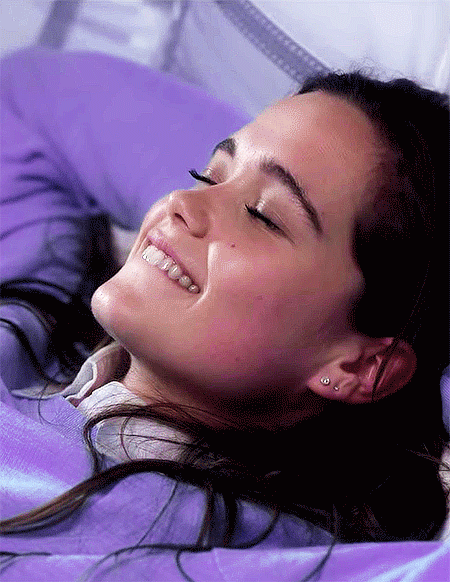
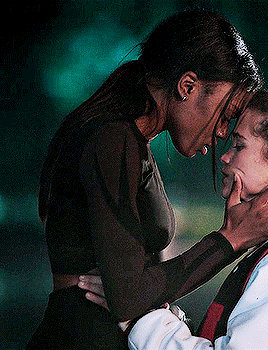
#first kill#calliette#juliette and calliope#juliette fairmont#sarah catherine hook#jules is a fuckboy#calliope burns#imani lewis#cal is play hard to get#wlw representation#it’s a romeo and juliet adaptation don’t forget
102 notes
·
View notes
Note
Sweet Child aside, what were some things you really liked about Watching and Dreaming?
Spoilers below!
So many things. First, I was impressed by how much emotional impact they were able to pack into WAD with time constraints. Not a moment was wasted, everything gelled so well.
My family and I are rewatching TOH from the beginning and there are so many threads that were pulled together in WAD. Things that seemed like throwaways but were significant.
I loved Raines role in the story. They are a great character that I wanted more from and was glad I got to spend more time with. The Collector’s arc was really good.
As a parent, I felt an ache for a kid who just needed positive family guidance. They are like the inverse of Anthony (the corn field kid) from that Twilight Zone episode . I cried when Camila’s puppet began to cry when Luz “died”.
I loved Papa Titan being gender fluid, and how all expectations were subverted and reworked to show that conflicts were messy and remained (Darius and Eber keeping their eyes on Vitmir, Adrien and Terra because of course some of those Coven Heads would have been power hungry) but it showed that there was a path forward and a way for healing.
I can keep going on. Harpy Lilith? Obviously I loved Hunter becoming a palisman carver and how at ease he and Willow were together. Amity hugging Lilith. The photos with the implications that Camila gets drunk with Eda on Apple blood, all the Vee being happy pictures, Grom…
I am done for now. My work break isn’t long enough for me to keep going.
Does that help?!?
17 notes
·
View notes
Text
The more I think about the Barbie mobie, the more I'm convinced it doesn't subvert ANYTHING. People keep pointing out how unfair it is that Ken and Ryan Gosling are getting all this attention from the press because it's misogynistic that the main character and actress aren't the ones lauded for their portrayal.
Guess what? It's because Ken is *fun*. Barbie in the movie isn't fun at all! She isn't playing with femininity at all! None of the barbies act outside of their established roles (which is interesting given that study about gendered child play behavior, but idk if intentional). Is Barbieland an expression of childhood play OR is it the made-up corporate playland that Mattel made - a world where Barbie can be "anything" but only if you buy these 10,789 other plastic parts and clothes.
Leading up to the movie, so many people were excited to play pretend and dress up! I was floored by the public response: femmes greeting each other with wide smiles and high feminine looks, men dressed in pink, people having fun. I had never seen a more blatant and pure love for being feminine and playing with it, especially from the men.
And then the movie happened.
And all I could feel was irritation.
I was irritated that Barbie had problems, that she had to GROW UP, face the REAL WORLD, understand that women are OPPRESSED and beaten down and live hard fucking lives. I was uncomfortable because I already DID ALL OF THIS. I already did! I already KNOW what it's like to be a woman, okay! I know! I know it fucking sucks! Can't we catch a fucking break at ALL?
Can women like, just, PLAY WITH FEMININITY without being constantly reminded of how much the patriarchy takes away from that?
Ken gets to play with patriarchy. He gets to have low stakes ideas and a funny, base-level way of thinking that is more attuned to being a doll. Having a child write the script for you. I get that the plot is Barbie becoming a real person, so it makes sense for her to be less... naive. But I so wish we got that. I wish I got escapism. I wish I got funny ha-ha messy doll fights and childhood feelings.
I'm just so fucking tired. I hate being a victim. I hate acting like I'm suffering because of my femininity. I'm...literally not?? I'm having the best time of my life, wearing a pink skirt and loving life and loving women, and this movie gave me none of that.
6 notes
·
View notes
Text
Leather
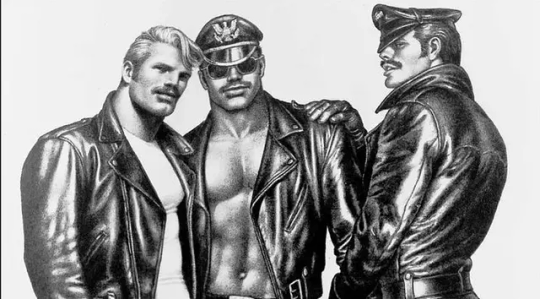
A man on Grindr once told me that “leather was like drag.” I pressed him on the point multiple times, but he couldn’t say much more than that. He typed it out with such finality that it seemed to him perfectly self-explanatory. I guess I understood what he was getting at, but I hate pronouncements. Pronouncements are for people who somehow have lived in this world as I have and still have the balls to think that they can be right. Maybe it is my millennial hemming and hawing that is the real problem.
Though I hated how he said it, I got the gist of what that man on Grindr meant. Gay men wear leather to become someone else. Just like in drag, there are entire leather productions and competitions where various men wearing leather go up on stage and perform for an audience. I have caught glimpses of these shows sometimes while I have hung around the Eagle or Bullet. The newly announced winner demonstrates the appropriate shock and surprise and receives a leather sash with big bolded letters pronouncing him as “Mr. Bullet Leather 2023.”
There are layers here; some stretching back to rituals and observances only known by the daddies and the boys who love them. Some reason that this system of competition exists and exalts certain characteristics. I am not intending to suggest that we are performing on the bones of old ritual that has lost all meaning. Quite the opposite actually. I think the entire production is imbued with more ritual significance now more than ever.
Leather serves as a stark contrast to drag in a lot of ways. While drag is meant to accentuate femininity and challenge gender conventions, leather attempts to solidify roles and to reinvigorate an image of masculinity. But it is an image of men refracted and warped across time from an era immediately prior to AIDS that gay men seem to yearn for. The idea of men who wear leather jackets and Levi jeans that draw all eyes to their bulge, sport an aggressively prominent mustache, and struts with a cigar in mouth. Except this man existed in the 1960s and 1970s, and now he does not.
Oh sure, that man probably never truly existed. He was always fantasy. An amalgamation of characteristics that a gay man wanted both to emulate and be dominated by. But somewhere between then and now that man went from living to extinct. Now at every leather bar in America you can watch locals attempt to recreate that now extinct man for an audience who never met him. Like a game of telephone across generations and time until you are left with men who are being worn by leather — not wearing leather.
The reason this ritual is so much more important now is because the oft-revered leather daddy symbol harkens back to a time when gay men had purpose. Cruising, bathhouses, gay bars, leather events, and many other subversive acts were radical before the 1990’s because they either directly challenged the status quo or were the only means by which gay men could subvert it. Without the radical or subversive element which imbued these spaces and acts with meaning, many have lost their appeal and edge.
This degradation over time is a topic that modern queer authors have been grappling with for the past few years. Books like Cruising; Gay Bar; or Times Square Red, Times Square Blue have raised the alarm bells on the disappearance of gay public encounters. These books all typically have the same premise: a famed gay institution is dying and that is a bad thing because of X. While all these authors acknowledge that these institutions were human and therefore contained problematic elements, they all speak to a common loss. The loss of equitable sexual relations between men, cross-class commingling inherent in public encounters, and a subversive edge that keeps the whole thing interesting.
Radical sexual acts are now all about bespoke and customized experiences meant to appeal exactly to your sexual desires. No longer do you need to traipse through some bushes in your local public park before weariness has you settling for the older, out-of-shape man you saw milling around. Just open the app and find the exact model you are looking for and they will be at your doorstep before you know it. Even the glory holes in bathhouses have expanded in size so people no longer have to suffer the horror of enjoying a sexual experience without knowing the exact age, height, and BMI of the person they are blowing.
No doubt there are justifiable fears and reasons driving this reality. Young gay men raised by concerned straight parents who passed on their fear of that “gay disease” AIDS, a population raised on the “stranger danger” curriculum, and a culture which, despite preaching equity, has yet to apply that to lust. But one can’t help feel that something went awry here.
What is left then? Groups of men putting on custom leather gear all bought from shops now offering express global shipping on orders over $40. Elaborate themed nights at leather bars catering to an increasingly bored community that has resorted to newer kinks in the name of subversion. Picky cruisers who would rather walk three hours in a dark park than touch someone they don’t immediately find attractive. Attractive men who claim that their commodified sexual acts broadcast on Twitter and OnlyFans are really in the name of liberation for all.
Leather men and the spaces they inhabit have taken on a new desperate edge. The ceremonies and pageantry becoming an increasingly tenuous link to a time and place that no longer exists, but that young gay men wished they were alive to experience. Vests, chaps, and mustaches all seeming to say “Remember? This used to have a purpose!”
Come to think of it maybe that guy on Grindr was right all along. Leather is sort of like drag.
5 notes
·
View notes
Note
idea i felt u would want to know. so yknow trans george right. amazing perfect great fantastic love it. this isn’t super creative or ground breaking but: sort of mulan au where george is trans and joins the army as a man by fabricating certain documents and all as a chance to get away from family although he loves them so he can live as a man (under the guise of volunteering as a nurse or something is what he tells them) but yeah thought of this brushing my teeth last night
GREAT MINDS ANON!! GREAT MINDS!!!!!! tho i can't take all the credit. @hellofanidea has definitely played a major role in all this-- i want to shout him out bc i love him but also like. he and i talked about trans!George in the canon timeline before, too!
more rambling under the cut bc it's 2am and i am slightly TOO excited about this ask and a bit too delirious.
god ok like this shit isn't what you sent an ask for but like just to give context-- jem and I have been developing two trans OCs since june 2021, both of whom were created to subvert the Mulan Trope. like, one is a trans woman (my oc, named Natalie Morse) who, prior to enlisting, knew that she was trans and was already half-way to living as a woman (this is an oversimplification of this character but whatever that's the general gist), but has had to stuff all that back in (to the detriment of her mental health and sense of identity) in order to enlist!
the other OC (who was created by @hellofanidea) is a trans man named Arthur Benjamin Foster who does EXACTLY this. GOD i want so badly for all of you to see him and read his story because! because!!! i just love Arthur so much, he's like. the best male character in my heart and his backstory continues to poke me in the feels constantly!!!!!! i curse how slow i write because GUH i have so many feels for these two and their situation and honestly? playing with gender fuckery with these characters has been so SO lovely like. i learned so much of myself and my gender with these two. and just. they're great. i love them.
BUT ANYWAY there's your context for the next thing i'm about to say: jem and I have spent many hours discussing the logistics of how a trans man might enlist for the army and how he might manage to stay relatively unsuspected and 'twas truly a situation that is the source of many shenanigans and UGH the GENDER FUCKERY of it all because on top of the logistics of going relatively un-clocked in the army as a trans person, we've also discussed so much the paradox of being "in the closet" but simultaneously also being "out" in that any trans man must now keep their body a secret, but also, outwardly, and amongst everybody, they are men. like. there's no contest. there's no deadname to call them-- none of their peers know what the deadname is. and that's such an interesting thing to me, ya know?
furthermore, the logistics of the binder. and showers. and relatively staying clean. of course, we've talked about this and come to the conclusion that some people have to know at least in order to offer help! and that always melted my heart a bit because! not only are your peers encouraging and aggressively validating your gender by calling you your name instead of your deadname, but they are also validating you by protecting you from a system that aims to strip you of your identity. and like. that always made me so happy?
like, one of my favorite things to write about Arthur and trans!george in the canon timeline is that, at some point? people know and those same people love them enough to hide them and help them. and that's my favorite part of it.
a;kgalkhflksklfhslfkldlsa ok im sorry anon i have so many thoughts about this but no braincells at the moment to make them sound pretty?
pls send me another ask when I'm more coherent to answer HAHAHAH idk idk i love trans characters i love gender fuckery i would LOVE to talk about it more with you. thank you! you're greatly appreciated!!! MWAH!!!!!!!!!!
4 notes
·
View notes
Text
disability in the Six Of Crows Duology; an analysis of Kaz Brekker, Wylan Van Eck, and the fandom’s treatment of them.
****Note: I originally wrote this for a tiktok series, which im still going to do, but i wanted to post here as well bc tumblr is major contributor to what im going to talk about
CW: ableism, filicide, abuse
In the Six of Crows duology, Leigh Bardugo delicately subverts and melds harmful disability tropes into her narrative, unpacking them in a way that I, as a disabled person, found immensely refreshing and…. just brilliant.
But what did you all do with that? Well, you fucked it up. Instead of critically looking at the characters, y’all just chose to be ableist.
For the next few videos paragraphs im going to unpack disability theory (largely the stuff surrounding media, for obvious reasons) and how it relates to Six Of Crows and the characterization of Kaz Brekker and Wylan Van Eck, then how, despite their brilliant writing, y’all completely overlooked the actual text and continuously revert them to ableist cariactures.
Disclaimer: 1. Shocker - i am disabled. I have also extensively researched disability theory and am very active in the disabled community. Basically, I know my shit. 2. im going to be mad in these videos this analysis. Because the way y’all have been acting has been going on for a long ass time and im fuckin sick of it. I don’t give a shit about non-disabled feelings, die mad
Firstly, I’m going to discuss Kaz, his play on the stereotypical “mean cripple” trope and how Bardugo subverts it, his cane, and disabled rage. Then, I am going to discuss Wylan, the “inspiration porn” stereotype, caregivers / parents, and the social model of disability. Finally, I will then explain the problems in the fandom from my perspective as a disabled person, largely when it comes to wylan, bc yall cant leave that boy tf alone.
Kaz Brekker
Think of a character who uses a cane (obviously not Kaz). Now, are they evil, dubiously moral, or just an asshole in general? Because nearly example I can think of is: whether it be Lots’O from Toy Story, Lucius Malfoy, or even Scrooge and Mr.Gold from Once Upon A Time all have canes (the last two even having their canes appear less and less as they become better people)
The mean/evil cripple trope is far more common than you would think. Villains with different bodies are confined to the role of “evil”. To quote TV Tropes, who I think did a brilliant job on explaining it “The first is rooted in eugenics-based ideas linking disability or other physical deformities with a "natural" predisposition towards madness, criminality, vice, etc. The Rule of Symbolism is often at work here, since a "crippled" body can be used to represent a "crippled" soul — and indeed, a disabled villain is usually put in contrast to a morally upright and physically "perfect" hero. Whether consciously on the part of the writer or not, this can reinforce cultural ideas of disability making a person inherently inferior or negative, much in the same way the Sissy Villain or Depraved Homosexual trope associate sexual and gender nonconformity with evil. ”
Our introduction to Kaz affirms this notion of him being bad or morally bankrupt, with “Kaz Brekker didn’t need a reason”, etc. This mythologized version of himself, the “bastard of the barrel” actively fed into this misconception. But, as we the audience are privy to his inner thoughts, know that he is just a teenager like every other Crow. He is complex, his disability isn’t this tragic backstory, he just fell off a roof. It’s not his main motivation, nor does he curse revenge for making him a cripple - it is just another part of who he is.
His cane (though the shows version fills me with rage but-) is an extension of Kaz - he fights with it, but it has a purpose. Another common thing in media is for canes to be simply accessories, but while Kaz’ cane is fashionable, it has purpose.
The quote “There was no part of him that was not broken, that had not healed wrong and there was no part of him that was not stronger for having been broken.” is so fucking powerful. Kaz does not want nor need a cure - its said in Crooked Kingdom that his leg could most likely be healed, but he chooses not to. Abled-bodied people tend to dismiss this thought as Kaz being stubborn but it shows a reality of acceptance of his disability that is just, so refreshing.
In chapter 22 of SOC, we see disabled rage done right - when he is called a cripple by the Fjerdan inmate, Kaz is pissed - the important detail being that he is pissed at the Fjerdan, at society for ableism, not blaming it on being disabled or wishing he could be normal. He takes action, dislocating the asshole’s shoulder and proving to him, and to a lesser extent, himself, that he is just as capable as anyone else, not in spite of, but because he is disabled. And that is the point of Kaz, harking back to the line that “there was no part of him that was not stronger for having been broken”.
I cried on numerous occasions while reading the SOC duology, but the parts I highlighted in this section especially so. I, as many other disabled people do, have had a long and tumultuous relationship with our disability/es, and for many still struggle. But Kaz Brekker gave me an empowered disabled character who accepts themselves, and that means the world to me.
Keeping that in mind, I hope you can understand why it hurts so much to disabled people when you either erase Kaz’s disability (whether through cosplay or fanfiction), or portray him as a “broken boy uwu”, especially implying that he would want a cure. That flies in the face of canon and is inherently fucking ableist. (if u think im mad wait until the next section)
Next, we have Wylan.
Oh fucking boy.
I love Wylan so fucking much, and y’all just do not seem to understand his character? Like at all? Since this is disability-centric, I’m not going to discuss how the intersection of his queerness also contributes to these issues, but trust me when I say it’s a contributing factor to what i'm going to say.
Wylan, motherfucking Van Eck. If you ableist pricks don’t take ur fucking hands off him right now im going to fight you. I see Wylan as a subversion another, and in my opinion more insidious stereotype pf disabled people - inspiration porn.
Cara Liebowitz in a 2015 article on the blog The Body Is Not An Apology explains in greater detail how inspiration porn is impactful in real life, but media is a major contributing factor to this reality. The technical definition is “the portrayal of people with disabilities as inspirational solely or in part on the basis of their disability” - but that does not cover it fully.
Inspiration porn does lasting damage on the disabled community as it implies that disability is a negative that you need to “overcome” or “triumph” instead of something one can feel proud of. It exploits disabled people for the development of non-disabled people, and in media often the white male protagonist. Framing disability as inherently negative perpetuates ideals of eugenics and cures - see Autism $peaks’ “I Am Autism” ad. Inspiration porn is also incredibly patronizing as it implies that we cannot take care of ourselves, or do things like non-disabled people do. Because i stg some of you tend to think that we just sit around all day wishing we weren’t disabled.
Another important theory ideal that is necessary when thinking about Wylan is the experience of feeling like a burden simply for needing help or accommodations. This is especially true when it comes to familial relationships, and internalized ableism.
The rhetoric that Wylan’s father drilled into his head, that he is “defective”, “a mistake”, and “needs to be corrected”, that he (Jan) was “cursed with a moron for a child” is a long held belief that disabled people hear relentlessly. And while many see Van Eck’s attempted murder of Wylan as “preposturous” and overall something that you would never think happens today - filicide (a parent murdering their child) is more common than you would like to believe. Without even mentioning the countless and often unreported deaths of disabled people due to lack of / insufficient / neglectful medical care, in a study on children who died from the result of household abuse, 40 of 42 of them (95%) were diagnosed with disabilities. Van Eck is not some caricature of ableist ideals - he is a real reflection on how many people and family members view disability.
Circling back to how Wylan unpacks the inspiration porn trope - he is 3 dimensional, he is not only used to develop the other characters, he is just *chefs kiss* Leigh, imo, put so much love and care into the creation of Wylan and his story and character growth that is representative of a larger feeling in the disabled community.
That being said, what you non-disabled motherfuckers have done to him.
The “haha Wylan can’t read” jokes aren’t and were not funny. Y’all literally boiled down everything Wylan is to him being dyslexic. And it’s like,,,, the only thing you can say about him. You ignore every other part of him other than his disability, and then mock him for it. There’s so much you can say about Wylan - simping for Jesper, being band kid and playing the fuckin flute, literally anything else. But no, you just chose to mock his disability, excellent fucking job!
Next up on “ableds stfu” - infantilization! y’all are so fucking condescending to Wylan, and treat him like a fucking toddler. And while partly it is due to his sexuality i think a larger portion is him being disabled. Its in the same vein of people who think that Wylan and Jesper are romantically one sided, and that Jesper only kind of liked Wylan, despite the canon evidence of him loving Wylan just as much. You all view him as a “smol bean”, who needs protecting, and care, when Wylan is the opposite of that. He is a fucking demolitions expert who suggested waking up sleeping men to kill them - what about that says “uwu”. You are treating Wylan as a burden to Jesper and the other Crows when he is an immensely valuable, fully autonomous disabled person - you all just view him as damaged.
And before I get a comment saying that “uhhh Wylan isn’t real why do you care” while Wylan may not be real, how you all view him and treat him has real fucking impacts and informs how you treat people like me. If someone called me an “uwu baby boy” they’d get a fist square in the fucking jaw. Fiction informs how we perceive the world and y’all are making it super fucking clear how you see disabled people.
Finally, I wanted to talk about how the social model of disability is portrayed through Wylan. For those who are unaware, the social model of disability contrasts the medical model, that views the disability itself as the problem, that needs to be cured, whereas the social model essentially boils down to creating an accommodating society, where disability acceptance and pride is the goal. And we see this with Wylan - he is able to manage his father’s estate, with Jesper’s assistance to help him read documents. And this is not out of pity or charity, but an act of love. It is not portrayed as this almighty act for Jesper to play saviour, just a given, which is incredibly important to show, especially for someone who has been abused by family for his disability like Wylan, that he is accepted.
Yet, I still see people hold up Jesper on a pedestal for “putting up with” Wylan, as if loving a disabled person deserves a fucking pat on the back. It’s genuinely exhausting trying to engage with a work I love so much with a fandom that thinks so little of me and my community. It fucking shows.
Overall, Leigh Bardugo as a disabled person wrote two incredibly meticulous and empowered disabled characters, and due to either lack of reading comprehension, ableism, or a quirky mix of both, the fandom has ignored canon and the experiences of disabled people for…. shits and giggles i guess. And yes, there are issues with the Grishaverse and disability representation - while I haven’t finished them yet so I do not have an opinion on it, people have been discussing issues in the KOS duology with ableist ideals. This mini series was no way indicative of the entire disabled experience, nor does it represent my entire view on the representation as a whole. These things need to be met critically in our community, and talked about with disabled voices at the forefront. For example, the limited perspective we get of Wylan and Kaz being both white men, does not account for a large portion of the disabled community and the intersection of multiple identities.
All-in-all, Critique media, but do not forget to also critique fandom spaces. Alternatively, just shut the fuck up :)
happy fucking disability pride month, ig
#soc#six of crows#kaz brekker#soc kaz#kaz talk tag#kanej#grisha#grishaverse#ketterdam#leigh bardugo#bardugo#crooked kingdom#ck#wylan#wylan van sunshine#wylan supremacy#jesper x wylan#wesper#jesper fahey#shadow and bone#wylan van eck#jan van eck#ableism#ableist bullshit#ableist slurs#disability#disability pride month#i will punch you in the face#el oh el#laugh out loud
2K notes
·
View notes
Note
keep seeing that the writers confirmed that sokka had the capacity to be a waterbender, but was too skeptical to ever access it. i'm so torn bc so much of his sokkaness comes from Not-Bending but also i feel like there's a lost waterbending parallel arc culminating in book 1 where katara reaches her potential in combat training she was denied, and sokka could have learned healing and embracing he is a nurturer and caretaker at heart. both of them unburdened of gender stereotypes they grew up in.
I don’t know, I think while they don’t fit traditional western gender roles sometimes (there’s not actually that much evidence of the SWT having rigid gender roles, better explained in this post) but the thing is their character arcs weren’t really rooted in breaking gender norms and that’s okay?
Katara prioritizes taking care of people around her. She acts ‘motherly’ and that’s not something that’s a character flaw. She’s not taking care of her friends as a matriarch or because of gender roles, she does it because one, she cares deeply about the people she loves and will be the person to take care of them when they aren’t taking care of themselves, she’ll be there shoulder to cry on, and she’ll be the one to hold them together when shit hits the fan. And two, she’s like that because that’s how she copes with situations. She takes care of others because that makes her feel better, safer, and more in control in the midst of war and hardship.

She’s a fighter and she’s good at it, but that doesn’t mean that she doesn’t value herself as a healer. Katara’s fundamental approach to helping the world isn’t in fighting, it’s in healing. Two of her most heroic moments in the show were saving Aang and Zuko and she didn’t do it with combat, she did it with healing. Something special to her as the Southern Water Tribe’s last waterbender and something so fundamental to what she values. She’s not meeting violence with violence, she’s meeting hardship with kindness, empathy, and nurturing. And it works.

And while Sokka’s biggest strength is his intelligence and his ability to strategize and while he did have a minor arc of learning to overcome gender roles, that isn’t his main arc. Sokka’s main arc was learning how to value himself when surrounded by people who seemed more capable than him in combat. His arc was learning how to not let failure define him and how to stop comparing himself to others-- his dad, his sister, his friends, everyone. We get to watch him grow as a leader, which he always was, but his journey from ‘sole warrior of a village of 20 people’ to ‘lead strategist in taking down the entire Fire Nation air fleet’ wasn’t linear. He failed repeatedly, but we saw him learn how to move forward and come out stronger.

Fundamentally, Sokka was a warrior, a leader-- and that’s what he strived to be. He spent his whole life feeling like he couldn’t protect the people and we watched him get stronger, more skilled, and more confident as the series progressed. We watched him become a full-fledged warrior over the course of the series, which was what he wanted.

That’s who they are and that’s okay. They didn’t need to subvert gender norms because where they came out and how they both contributed to ending the war circled back to their own dilemmas. Katara in wanting to save the people she loved after her mother died for her and Sokka in wanting to protect the people he loved after so many years of feeling like he wasn’t strong enough.
Both of them got to look a war that had taken so much from them in the eye and say that they were going to change things on their terms. The war wasn’t going to take anyone or anything else from them. They were the ones who were going to defeat the Fire Nation by outsmarting them, by being stronger than them, and by healing their own wounds. They’re both protectors and go about protecting the people they love in the ways that make them feel empowered: Sokka as a leader and Katara as a healer. Not to say that Katara wasn’t a fighter or that Sokka wasn’t nurturing, but how they grew and how they approached the war revealed fundamental aspects of what they valued, what they wanted to be, and what empowered them.

And what it comes down to, what separates Katara and Sokka and everyone else from the Fire Nation, is that they’re coming from places of love. They’re fighting for the people they love. For family. For their tribe.
707 notes
·
View notes
Text
I accidentally managed to fall for In Other Lands by Sarah Rees Brennan more than I usually fall for books (as in I read it in one evening then spent today reading all of the available fanfic), so I decided to make one of those "what I love about this book" posts. Enjoy? (Also warning for spoilers)
First of all, surprise queers!!! I had no idea that would be the case from the summary and it turned out to be great bisexual rep? And a same-sex relationship as endgame? And other queer minor characters? I love this
Elliot. I love this obnoxious disaster child who grows up to be just as much of a disaster who cannot communicate (but he recognises when he's hurting others and makes an effort to be better). I have so much love for this ranting and annoying nerd who changes the world through diplomacy. It's a nice change for a protagonist
Wings. Do I need to say more? I have a soft spot for winged characters, please don't judge me
And I love Luke so much, he keeps trying and keeps being a good friend who goes along with Elliot's stupid schemes even when he thinks Elliot hates him. His bond with Serene is amazing. I also really like his arc about accepting himself as a half-harpy
Also, I fucking called it on Luke liking Elliot this whole time. So glad they finally managed to communicate
Something something love as a choice and how the other person has to choose you back for it to work... Many thoughts
I love how this book comments on the fucked-upness of the "magical land" as a trope with all the wars, glorification of violence, child soldiers and the idea of "inheretly evil sentient species" (which I hate with a passion). Elliot the pacifist? Who eventually grows used to weapons and death? While being aware of how fucked up it is? I'm here for it
Golden is amazing for rejecting Serene's bad love letters that are basically just bragging. I still don't know what I feel about the elves (I know the point is to subvert gender norms to show how ridiculus they are, but it kind of goes further than in both our society and the borderlands. And Serene sometimes seems so clueless about it? Just glad it was commented on that neither way is good). I'm also proud of Serene's character development, go gender equality and defying societal gender roles!
I have many more thoughts, but this is getting pretty long so I'm ending this with my firm opinion that there should be more hugs. The group hug after Serene and Luke return from the war is amazing and I need more of them holding onto each other, just the plain relief that they are together and alive and okay. I might need to write a fic
#in other lands#raven talks#sorry to all of my followers I know none of you asked for this#but just like elliot I do what I want#which in this case means posting book rambles in the middle of the night#but seriously go read this book#it's very good
58 notes
·
View notes
Text
The Ember Island Players: performing toxic masculinity and narrative complicity in propagating misogyny
Initially I wasn’t going to respond to concerns about Katara’s racist/misogynistic portrayal in the Ember Island Players with anything more than snarky tags, but apparently I can’t keep my mouth shut, so I’m posting my response as a standalone meta about how the writers’ insistence on creating drama for drama’s sake leads them to--in lieu of actual character development--fall back on lazy narrative shortcuts whereby a performance of toxic masculinity against a gendered heternormative background is used to create tension in a romantic relationship, presumably with the goal of keeping the audience invested.
The Ember Island Players is problematic for a lot of reasons, not least of which is the pervasive tone-deaf misogyny, including racialized misogyny, directed at Katara. There’s a lot of meta on this, so I’d like to focus on something different: Aang’s relationship with gender and romantic attachments.
Aang seems so uncharacteristically chagrined the whole episode: “I’m not a woman!” Based on his previous characterization up to this point:
The Fortuneteller. This is the same Aang who makes a necklace for Katara when she loses her mother’s. Observe how he responds to Sokka’s jibe about jewelry-making, which can be seen as a feminine pursuit:
Sokka: Great, Aang. Maybe instead of saving the world, you can go into the jewelry-making business.
Aang: I don’t see why I can’t do both.
Femininity isn’t presented as being mutually exclusive with narrative pursuits like saving the world which have traditionally centered male protagonists (especially if we take the entire canon of anything every written in any genre that’s not specifically, say, something like shoujo or jounen which are directed and young girls and women, the narrative focus on male personalities is overwhelming).
The Warriors of Kyoshi. Oh, and this is the same Aang that dressed up in full Kyoshi gear, kabuki makeup and all, without complaint. Why would he? After all, she was him in a past life.
(There’s a whole meta here about gender-critical analysis of kabuki productions where male actors typically assumed female roles and how Avatar both takes inspiration from this real-life kernel and subverts it in Rise of Kyoshi where Kyoshi’s signature look is not only an homage to her parental heritage but also a reimagining of who can inhabit what roles. Her legacy, though imperfect, is also notably feminist, taking face paint worn typically by men IRL and expanding it into war paint for women warriors.)
(There’s also great headcanon-adjacent meta here about gender non-conformity and non-binary identities in Avatar. Avatar was not overtly explicit about its feminist or gender-progressive mindset outside of episodes like The Warriors of Kyoshi or The Waterbending Master, but it was still way ahead of its time. If anyone was to be presented or headcanoned in such a way, it would be the Avatar who’s lived a thousand lives, inhabiting a thousand skins and a thousand identities, including gender identities. There’s also cool crossover meta here about the Legend of Korra depicting a female Avatar in Korra with masculine tendencies and visible muscle vs Aang as a male Avatar with a gentler pacifistic spirit and gender nonconforming tendencies.)
The Cave of Two Lovers. Aang wears a freaking flower crown and is generally wholesome and adorable, even leading up to the “let’s kiss lest we die” scene with Katara. He’s not pushy or overly concerned with appearing masculine and it is in fact Katara who suggests the kiss and Aang makes a fool of himself. From the transcript:
Katara [Shyly, blushing.] Well, what if we … kissed?
Aang [Very surprised.] Us … kissing?
Katara See? It was a crazy idea.
Aang [Dreamily.] Us … kissing …
Katara [Fake-jokingly.] Us kissing. What was I thinking? Can you imagine that?
Aang [Fake-jokingly.] Yeah. [Awkwardly laughs.] I definitely wouldn’t want to kiss you! [Beat.]
Katara [Insulted.] Oh, well! I didn’t realize it was such a horrible option. [Angrily.] Sorry I suggested it!
Aang [Realizing his mistake.] No, no, I mean … if there was a choice between kissing you and dying …
Katara [Disgusted.] Ugh!
Aang [Desperately.] What? I’m saying is I would rather kiss you than die - that’s a compliment.
Katara [Enraged.] Well, I’m not sure which I’d rather do! [Slams the torch into his hand and storms away.]
Aang [Miserably.] What is wrong with me …
Aang, sweetie, this is not what you say to a girl you want to kiss, but generally, this is Wholesome™ and narratively, this is Good™. Eventually, they do kiss and that’s perfectly acceptable because there’s a whole conversation beforehand with humorous romantic framing. There’s consent and communication and initiative by the female protagonist. So solid A on the sensitive writing.
General Air Nomad culture. We don’t get a lot of Air Nomad culture in the show (and what little we do get what presented in such a misguided way, especially the whole commitment to forgiveness/pacifism which was handled in such an amateur black-and-white way from a writing perspective in season 3). But I digress. I really, really don’t think that Air Nomads who were so concerned with the spiritual side of bending and general existence had stringent notions of gender and romantic relationships–at the very least, they had very different notions of these issues compared to, say, the Northern Water Tribe. Canonically, even though AN philosophy emphasized detachment, Air Nomads practiced free love. Same-gender romance was freely accepted unlike in the homophobic Earth Kingdom (which even Kyoshi, a bisexual woman, wasn’t able to change) and the militant Fire Nation (Sozin outlawed homosexuality after declaring world war, essentially).
And though the temples were gender-segregated, it seems that the burden of raising children fell to the entire community instead of just the women. Both male and female Air Nomads are revered. In the case of the former, Guru Laghima who unlocked the power of flight through achieving complete detachment from the material world. And in the case of the latter, Avatar Yangchen, who has statues everywhere because she came to be revered as a deity not just among Air Nomads but in the physical world in general. Nowhere in Air Nomad philosophy is the concept of gender, romance, love, sexuality, relationships etc. etc. tainted with jealousy and possessiveness (especially towards women) or rigid binary heternormativity.
So this was Aang for the better part of the first half of the series. Not overly concerned with gender roles. Pretty much fumbling his way through his first crush like a lovesick puppy and it’s all very wholesome. Supposedly a classic product of Air Nomad upbringing.
Meanwhile, Aang in EIP:
Checks out Katara’s butt as she’s sitting down.
Gets mad at being portrayed by a woman.
Accuses Katara of being the racialized misogynistic version of herself depicted on stage ([sarcastically]“Yeah, that’s not you at all.”).
Nods in agreement when the misogynistic stage production of Katara presents her as the “Avatar’s girl.”
Unable to differentiate between fiction and reality and puts the onus on Katara to do the emotional labor to justify something she never said (”Katara, did you really mean what you said in there? On stage, when you said I was just like a … brother to you, and you didn’t have feelings for me.”)
Assumes they would just… fall into a relationship… just because he forcibly kissed her at the invasion and again pressures Katara to do the emotional labor to justify why their relationship is not how he wants it (“But it’s true, isn’t it? We kissed at the Invasion, and I thought we were gonna be together. But we’re not.” / “Aang, I don’t know.” / “Why don’t you know?”)
Forces a non-consensual kiss on her even though “I just said I was confused!”
So, there’s so many things wrong with this, most of which are a laundry list of behaviors typical of toxic masculinity:
Ogling
Outdated misogynistic humor (what’s wrong with being a woman?)
Verbal abuse
Offloading emotional labor
Gaslighting
Pressuring a potential romantic partner
Lack of direct communication about romantic desires
Lack of sensitivity
Lack of active listening
Lack of emotional intelligence and empathy
Lack of consent and sexual assault
I could go on and on.
My question is Where and when did he learn these toxic behaviors? What happened to the wholesome boy making necklaces, wearing flower crowns, and generally being adorable in a kid with a first crush kind of way when it comes to romance?
Now, you can argue that EIP players Aang has been through a lot, including being shot by lightning and actually dying, and after the failed invasion, he’s stressed out with the weight of the world on his shoulders and maybe not expressing himself or his desires in the best way and taking out all of his frustrations on Katara.
Except… that is all just conjecture because the actual writing of the show doesn’t put in the hard work and make those connections. Instead, they fall back on misogynistic tropes and toxic heternormative romance tropes and a forced love triangle subtext and they just, to put it politely, fuck it up, two and a half seasons’ worth of work, gone, in the space of one episode. And even if it weren’t conjecture, it would still be wrong of Aang to act the way he did.
Let’s list Aang and Katara’s interaction in relation to each other in season 3:
The Headband. “Don’t worry about them. It’s just you and me right now,” Aang says as he pulls Katara into a dance. I have qualms about the writing of this episode: the creators wasted a golden opportunity to flesh out the Air Nomad genocide because they were too busy playing footloose in a cave, they wrote Katara–the same Katara would said fuck you to Pakku, freed enslaved earthbenders from a Fire Navy prison, and became a spirit goddess ecoterrorist to help a village in an enemy nation–as uncharacteristically shy just so Aang could sweep in and pull her into a dance. But like fine, whatever. It’s cute and really well-chreographed and there’s actually appropriate romantic framing here for once and at the end of the dance, look at Katara’s face–she’s happy! Positive Kataang interaction, and I don’t actually mind it. 7/10.
The Day of Black Sun Pt.1. He forces a kiss on her on the mouth, taking her completely by surprise. A chaste kiss on the cheek and a wistful pining last look and “Be safe” might have been acceptable, but given Katara’s shocked and uncomfortable body language, the kiss on the mouth was not. Worse yet, the show just… forgets… to follow up on it for several episodes and when it’s brought up again, it’s used as a sledgehammer to punish Katara for not magically being with Aang. 0/10.
The Painted Lady. Let’s look at the transcript:
Katara [Using a disguised voice.] Well, hello Avatar. I wish I could talk, but I am very busy.
Aang Yeah, me too. I hate that. [Looks at Katara’s face from behind the veil.] You know, you’re really pretty, for a spirit. I don’t meet too many spirits, but the ones I do meet, not very attractive. [Looks at Katara suspiciously. Tries to look under the hat.]
Katara [Giggles nervously.] Thank you, but-
Aang You seem familiar too.
Katara A lot of people say that.
Aang [Suspicious.] No, you really seem familiar.
Katara Look, I really should get going. [Covers her face and runs, but Aang uses his airbending and blasts her hat up into the air, exposing her.]
Aang Katara?
Katara [Guiltily.] Hi, Aang.
Aang [Shocked.] You’re the Painted Lady? [Pointing at Katara.] But how?Katara I wasn’t her at first, I was just trying to help the village. [Takes her hat off.] But since everyone thought that’s who I was anyway, I guess I just kinda became her. [Drops her hat on the ground.]
Aang So you’ve been sneaking out at night? Wait, is Appa even sick?Katara He might be sick of the purple berries I’ve been feeding him, but other than that he’s fine!
Aang I can’t believe you lied to everyone, so you could help these people.
Katara I’m sorry, I know I shouldn’t have …
Aang [Happily.] No, I think it’s great! You’re like a secret hero!
Katara Well, if you wanna help, there’s one more thing I have to do.
Aang gives her a curious look. Cut to the Fire Nation factory. Aang and Katara run along the river’s edge toward it. Aang looks at the polluted water.
Aang You wanna destroy this factory?
Katara Yes. Sokka was just kidding, but he was right. Getting rid of this factory is the only way to help these people permanently.
He helps her blow up the Fire Nation smelting plant! Yes, he does call her pretty, but more importantly, this is one of the few times he acknowledges her faults (lying, deception, putting the mission at risk to help the enemy nation etc.) and still thinks she’s so fucking cool. He calls her a secret hero! There’s a lot of admiration and support here from Aang. He’s raising up Katara (instead of putting her down as in EIP) not because he sees her as a potential love interest but because he admires her and her compassion! This is great. Solid wholesome Kataang interaction. 10/10.
But all good things must come to an end…
The Southern Raiders. I’m not going to spend too much time on this because there’s a million pieces of meta on this episode. He’s completely out of line asking Katara to be forgive her mother’s killer, the source of her greatest trauma as a victim of targeted ethnic cleansing. Given that he’s a victim of ethnic genocide himself, although he personally wasn’t there for it/didn’t actually witness it unlike Katara, he should have understood. He does say “You need to face this man,” which is good and supportive and he should have stopped there, because he continues on to say, “But when you do, please don’t choose revenge. Let your anger out, and then let it go. Forgive him.” Stop. Stop stop stop. No one should tell a traumatized victim of ethnic cleansing how to deal with their trauma. By the end of the episode, Katara doesn’t kill him–but she crafts a third path as the conclusion to her hero’s journey and it is not the path of forgiveness that Aang preaches. Ironically, it is Zuko, who also confronts Ozai, the source of his greatest trauma, who never tells Katara what to do but follows her lead instead: even though he redirects lightning at Ozai and could have killed him, he doesn’t go through with it. He understands Katara and he understands that she needs to this. Kataang interaction rating: 0/10.
So that’s where we are with Aang and Katara in Ember Island Players. Some positive interactions that are appropriately romantically framed and some that are just wholesome and good… but all ruined by forced kissing and moralizing about Katara’s trauma instead of offering understanding. So that still doesn’t answer when Aang would have learned all of the toxic masculine/heternormative behaviors he displayed in The Ember Islands Players.
The only answer, I’m forced to conclude, is bad fucking writing, where the creators were not only tone-deaf in portraying Katara in a racist/misogynistic way or, you know, in writing solely for the male gaze because fuck half the audience, I guess, but they just wanted to create drama for drama’s sake. They completely disrespected their female lead and I would argue they disrespected Aang’s character too in making him a stereotypical self-insert Gary Stu who displays toxic masculine behavior without consequences because that’s what’s expected of a toxic heternormative romantic plot device.
And worse yet, they never follow up on this, just like with the kiss at the Invasion. In the last five minutes of the finale, Katara looks up at him with admiration for saving the world and then kisses him. This is not only a missed opportunity for character development for Aang, but also a big fuck you to the female audience because the message is clear: the guy gets the girl as a trophy for saving the world, and fuck input from the female half of the partnership because that’s just not important and is not worthy of screentime. But I guess screentime dedicated to displaying toxic masculine/heternormative behaviors without ever condemning such behavior as a follow-up is just fine! :)))
If the EIP was supposed to make an argument for Kataang, then it failed. but more important:
By the show’s own high standards, The Ember Island Players is a failed episode, full of bad writing and worse characterization. For a show that was so ahead of its time, this episode is a narrative black mark, a failure of progressive representation and a disservice to its main characters.
There’s some wholesome Sukka and Zuko/Toph interaction, but even that doesn’t manage to save this episode, especially given there’s no resolution to the central conflict: the relationship between Aang and Katara. The entire unnecessarily OOC and forced Kataang drama drags it down.
We know Aang is capable of lifting up Katara and being supportive of her, as he was in episodes prior. We could have had honest, supportive, and open dialogue between Aang and Katara that actually followed up on the Invasion kiss, with Aang clearly expressing what he wants, Katara expressing that maybe she didn’t want that right now, and Aang completely respecting that and them hugging at the end because their friendship/connection is much more profound than pre-teen romance. This is an instance where Aang could have chosen to center Katara’s feelings, for once, instead of his own out of selfless love. If this happened, I would have been okay with a Kataang ending. But that isn’t what we got, obviously.
Part of what appealed to me about Aang as a male protagonist in media aimed at young audiences is that he–at least initially–did not start out as a toxic self-insert Gary Stu lifted from every problematic heternormative romance film ever. In fact, given his playful trickster archetype, general kindness/gentleness, and his stance against violence (a typically masculine trait), he both subverted expectations of and expanded the boundaries of what a male protagonist in children’s media can look like. Unfortunately, the creators don’t go all the way with Aang. In fact, they took a step back with his portrayal in The Ember Island Players, where the creators not only rely on misogynistic tropes to create drama but also make him complicit in propagating said misogyny. And that’s just a damn shame because we could have had a wholesome Kataang storyline and a sensitive male protagonist who cares not about your outdated gender roles and respects his partner’s autonomy!
#atla#aang#katara#kataang#eip#meta#my meta#aang deserved better#katara deserved better#queer#heteronormativity#toxic masculinity#misogyny#feminist criticism#kataang critical#but only in the sense that the writers messed it up#nothing against kataang personally
94 notes
·
View notes